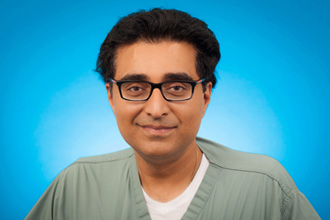St. Michael’s research leadership suggests a third diabetes medication effective in treating patients with heart failure

By Maria Sarrouh

Dr. Subodh Verma
A medication used to treat diabetes is able to reduce hospitalizations and cardiovascular deaths in patients with heart failure by 33 per cent, suggests a recent study published in the New England Journal of Medicine.
The multinational trial demonstrated that sotagliflozin, a diabetes medication, is effective when used as a therapy for patients with worsening heart failure requiring hospitalization. Dr. Subodh Verma, a cardiovascular surgeon at St. Michael’s Hospital and scientist at the Keenan Research Centre for Biomedical Science was the Canadian national lead investigator on the study. Dr. Lawrence Leiter, an Endocrinology physician at St. Michael’s, was a member of the executive committee of the trial.
“Whereas prior trials focused on results in outpatients, the new study tested whether this diabetes medication can be used in hospital or within three days of discharge,” said Dr. Verma. The benefit of sotagliflozin was consistent in patients regardless of their ejection fraction – a measurement of how much blood the left ventricle pumps out with each contraction.
Along with a team of global researchers, Dr. Verma has been investigating the effects of diabetes medications on patients with heart failure for over a year. Two of his previous studies on the topic have been published in the New England Journal of Medicine, making the most recent trial his third to be circulated in the prestigious journal.
“Heart failure is a grievous condition and it’s on the rise. We need multiple approaches to improve quality of life for these patients,” he said. “It’s very exciting to be part of a solution for patients and share results that provide tremendous hope.”
The first study tested dapagliflozin – a medication used to treat Type 2 diabetes — as a treatment on patients with heart failure and reduced ejection fraction, which happens when the muscle of the left ventricle is not pumping as well as normal. The group of patients who received dapagliflozin showed lower risk of worsening heart failure or death from cardiovascular causes. In a follow-up analyses co-led by Dr. Verma and published in Journal of the American Medical Association (JAMA), this effect was found to be similar in those with and without diabetes. The second trial demonstrated the efficacy of empagliflozin — also a medication used to treat Type 2 diabetes — in lowering the risk of cardiovascular death or hospitalization in patients with more advanced heart failure and a reduced ejection fraction.
“St. Michael’s leadership in the development of three novel approaches has helped change the management of heart failure globally,” Dr. Verma said, adding that Canadian and worldwide guidelines have changed in response to these studies. “We’ve really had an opportunity to look at this from bench to bedside.”
Researchers at St. Michael’s are exploring the mechanisms that generate the success of these treatments, Dr. Verma explained. A team of scientists at St. Michael’s led a clinical trial to determine if empagliflozin causes a decrease in left ventricular mass in people with Type 2 diabetes and coronary artery disease. The results suggest these new treatments can reduce left ventricular mass after a period of six months and remodel the heart.
“It’s been wonderful to have a translational bridge between basic science and these trials,” Dr. Verma said. “They have really transformed the paradigm of heart failure and ushered in a new era for these patients.”
The SOLOIST-WHF trial was funded by Sanofi and Lexicon Pharmaceuticals. TheDAPA-HF trial was funded by AstraZeneca and the EMPEROR-Reduced trial was funded by Boehringer-Ingelheim and Eli Lilly.
About St. Michael’s Hospital
St. Michael’s Hospital provides compassionate care to all who enter its doors. The hospital also provides outstanding medical education to future health care professionals in more than 27 academic disciplines. Critical care and trauma, heart disease, neurosurgery, diabetes, cancer care, care of the homeless and global health are among the Hospital’s recognized areas of expertise. Through the Keenan Research Centre and the Li Ka Shing International Healthcare Education Centre, which make up the Li Ka Shing Knowledge Institute, research and education at St. Michael’s Hospital are recognized and make an impact around the world. Founded in 1892, the hospital is fully affiliated with the University of Toronto.
About Unity Health Toronto
Unity Health Toronto, comprised of Providence Healthcare, St. Joseph’s Health Centre and St. Michael’s Hospital, works to advance the health of everyone in our urban communities and beyond. Our health network serves patients, residents and clients across the full spectrum of care, spanning primary care, secondary community care, tertiary and quaternary care services to post-acute through rehabilitation, palliative care and long-term care, while investing in world-class research and education. For more information, visit www.unityhealth.to.
